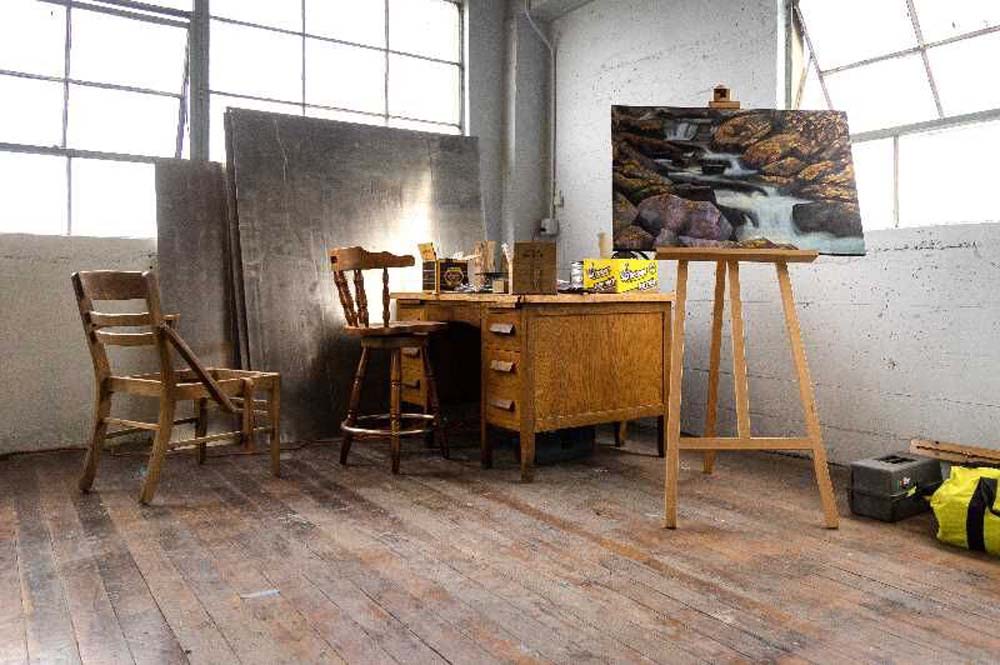Portland maker space welcomes ex-cons back to community
Published 12:00 am Friday, October 28, 2022

- Artists can rent by the square foot in quieter corners of the Past Lives maker space. Past Lives' next gallery opening Dec. 9 and features a blend of Portland artists and incarcerated artists.
Brandon Morlock was on LSD when he crashed his car in 2016, killing his friend and passenger Ryan Bowker. He served five years for vehicular manslaughter, during which he pledged to help released felons find employment. The Second Chance Act has highlighted how difficult it is for convicted felons to find housing and jobs upon their release into society, even when they are reformed and repentant. Morlock also believes prisoners are exploited for their labor inside prison. He says they are being paid as little as $30 a month to do such as work as building furniture, which is then sold under popular brands, without any recognition of who made it.
Trending
When he got out of prison in October 2020, Morlock worked at a small community makerspace in southeast Portland for several months, building wooden frames for art and photos. He began buying up old tools at estate sales and on Craigslist and recruited some workers and founded his own maker space, Past Lives at 2808 S.E. 9th Ave near the Ross Island Bridge, and opened it in September.
The name refers to the felon’s reputation and their wish to move on. Old tools
He leased half of the 52,000 square foot building in which the main tenant is Irwin Hodson, a printing company. Morlock is building out a woodshop where people can do woodworking, metalwork (welding and smelting), electronics, computer work, as well as setting aside large cubicles for artists to rent by the month as studios.
Trending
On a recent weekday, the space was alive with the sound of hammering and band sawing, and the screech of metal in tool and die machines.
Members, many of whom are ex-convicts, are building modular walls from plywood, which are painted white and mounted on wheels and suspended by steel cables, to give a flexible art gallery feel.
There are manual machines and CNC automated machining for metals. Including a 3,000-pound Giovanni radial arm drill press from Italy.
Just like the workers at and (a metal shop in Lake Oswego), Morlock is a lover of old analog tools. “The things that are being made are actually garbage compared to things that were being manufactured last century,” said Morlock.
The woodshop was the first part that Morlock put together, because he knew he would need it to build out the space. Members and staff are DIY in everything from kitchen cabinets and bookcases to the dividing walls. They built an airlock in the loading dock to make a sanding area.
Membership costs between $110 and $180 a month and offers 24/7 access to the facility.
Newbies can pay to train on the tools. There’s a saw stop table saw where the blade stops if you touch it, for safety’s sake.
There are other heavier duty tools, such as a forge for metal casting. They make ingots of copper from scrap pipes, transformers and wire, and Nordic gold bronze. “Then we have machinable material to work with. This is going to be cut into squares to make copper buttons for a long sleeve work shirt I am making.” Morlock himself makes jewelry.
He and some members made a 4,000-pound welding table from a steel plate that cover holes in the street, with I-beam girders for legs. “I stole it,” he jokes. “This whole operation was all built on scrap and garbage. Originally, I had no money, so I was digging around in scrap bins.”
Morlock adds, “I found like 20, 20-foot long copper pipes sitting in a garbage pile outside of this building. So that’s some of it. And then some of that came from us remodeling the building.”
Stacked up is a bunch of Brazilian cherry wood floorboards. “Somebody was remodeling their home and didn’t want it, several truck loads. This is gorgeous wood, all vertical grain pattern. This is insanely expensive and gorgeous, gorgeous wood.” After spending six months pulling all the nails, members will sand it and finish it with natural oil to turn it red again.
Tea and an ass kicking
Useful wood like this is being used to make picture frames and build a 31-foot dining table for the upstairs lounge, to encourage members to bond at potlucks and monthly teas. A forklift truck was lying about, abandoned, until someone got the power working again.
“We have people that are amazing with every kind of machinery, engineers and people that do electronics and machine repair. They had it running in 15 minutes,” said Morlock.
Donated machines waiting to be repaired are stored in various nooks. The space has a freeform feel to it — a pile of wood taped off here, an office converted into a digital studio there. Everything is very rough and ready, but Morlock claims it is secure and the members are very honest. “I leave my laptop out here all the time, no one touches your stuff,” he says, stressing that ex-convicts can reform. “And in prison, if you steal stuff, you get your ass kicked.”
Art studio space is $3.75 per square foot per month, plus monthly membership. People can also have a work-trade membership where they clean, build or teach skills for 10 hours a month instead of paying cash. Their half of the building is slowly coming to life. There are 12 full time staff and 77 paying members. There are also mentors, advisors and other volunteers constantly in the building.
The provides mentorship to people hoping to start businesses. He connected with them in prison and was assigned three mentors. “They would let me call them from the prison phones and write letters and stuff to them. And they helped with my business plan before I was released and when I got out.”
Hustling
Morlock started Past Lives with some friends from prison. They were struggling to make picture frames, four of them in a 10-by-10 space, when an engineer called David Champion saw them. “He sees me and my buddies, hustling on these picture frames I gave him my spiel about what I’m trying to accomplish with Past Lives, and he sits me down in the living room, makes coffee and asks me 1,000 questions. And then he tells me, ‘I tried to start a woodworking company here and failed. I’m an engineer, I’m not a businessperson. It looks like you’re doing a great job. Like, I never made a single thing.’ He was tired of paying for tool storage. “I knew the man for like 45 minutes and gave me the key to his storage unit and told me to take whatever I want. I can pick a number and pay him back someday. Wow! So, we got about 30 grand worth of equipment.”
But Past Lives still needed to raise $3,000 for rent, otherwise he couldn’t take the tools.
“I went home, talked to my mom and she gave me $1,700. So, we had all the things shipped in, it all converged perfectly.” They moved in, with the tools. With 20 days left and only four members at Past Lives, he still needed $1,200. He got home one evening and checked his mail. “It was my stimulus check, 1,200 bucks. So, we got we got that spot.”
One of the financial backers is Glenn Dahl, co-founder of Dave’s Killer Bread, which is also a well-known second chance employer. Dahl invested in Past Lives and guaranteed the lease on this building and attends leadership meetings and also does the HR. Morlock owns 85 % of the limited liability company.
Inside friends
Today Morlock says the ten members who are formerly incarcerated have an existing network of people that are still serving time. They want to build a network of artists within prison and sell their work. Some of it is sepia watercolors made with instant coffee, a cross between portraits from photos, mystical imagery and flash art like tattoos. The art materials are limited but they have time.
Morlock met some people in the Oregon Department of Corrections’ minimum security South Fork Forest Camp, where prisoners do reforestation and firefighting. (“I was wiping tables. No one’s getting me in a forest fire for $6 a day,” Morlock said.)
“People in prison are making $30 a month for labor. You can imagine the value of artwork when you’re selling it to other inmates in the economy in which everybody only has $30 a month.”
He adds, “They’re forced to in many cases, to do welding, fabrication, woodworking, garments, electronics. So, they work 10 to 50 years as a tradesperson, then they receive no support on the outside, getting their lives together, or actually finding a job or being able to leverage the only asset that they have in their life, which would be a great skill.”
Roles are fluid.
The woman who has been doing social media for Past Lives, ten hours a month, is also learning how to weld and forge. “She’s taking advantage of the entire atmosphere to learn all the different trades,” explained Spokesperson Ryan McAbery. “People are multifaceted here, in this community we all have different skill sets that a mesh really nicely, but they’re really broad.”
Camp buddies
Morlock met Nathan Mosley at South Fork. They both liked being allowed out of prison to learn about forestry and give back to the community. Mosley got out in May 2022, and he teamed right up with Morlock as a supervisor, at $27.25 an hour. Another friend hooked him up with a warehouse job with benefits and Mosley was on his way to work when Morlock called him with a better offer. “I quit before I started,” Mosley said.
The state will give prisoners six months of rent when they come out. Mosley lives in an apartment run by Central City Concern, a nonprofit on the front line of the housing crisis.
“There are places to live, sober apartments, and I’ve been good with my money and have been putting in for different places,” Mosley said. Southeast Works and Flip the Script have been helping him with housing applications and appeals. In five years, he hopes to be running another Past Lives in another part of the region. “I spent eight of the 10 years that I was in, in the education system inside, helping guys get their GED, and college prep, and English as a second language.”
Mosley is from Washington, so all of his support base and family is up there. “When I got out all I had was the friends that I made on the inside, and those are few and far in between, you know? People don’t get that close,” Mosley said.
There are and most of them will get out some day and need to reintegrate.
Phoebe’s Design for living
Creative Director Phoebe Valenti is in charge of the Past Lives brand and how the place looks and feels. She has a background in construction design and the arts. “I want to create business relationships is the community for fabrication and manufacturing, for potentially full interior or exterior design projects,” Valenti said. She uses CAD tools such as 2020 and SketchUp. She was not in prison, she was an artist who found she could sell her painting there better than on Instagram.
Valenti hopes designers will come to Past Lives and commission items for fabrication, such as furniture. She’s getting a general contracting license for Past Lives and developing a manual to streamline the fabrication process. Wages vary from the low twenties to thirties per hour, although one person who is working on a welding job is on $50 an hour.
“So not just ‘How can we get this done in the easiest, quickest, cheapest way?’ But ‘How can we achieve this that make our abilities shine, like the tables upstairs or the kitchen cabinets?'” Valenti said.
“We could build a house, we have everyone we need to, but that would be jumping in the 100-foot end of the pool when we’re still in the shallow end.”
Valenti even thinks Past Lives can beat the supply chain blues.
“Cabinets used to take four to six weeks, now they’re going to take 18 weeks. Whereas the cabinets upstairs were made for less money, and in less than two weeks, for an entire kitchen and the level of quality is better.”
Valenti has kids aged two and four and must work, and totally bought into Past Lives vision.
“It’s hard to see a system breaking so clearly and then see this opportunity for something different. It feels so much more natural to work directly with the people making things instead of with a factory or with sales reps,” Valenti said.
How it started
Morlock, who goes by one name, explained how Past Lives came out of a tragedy he caused. “I’ve been interested in collectives and communes like this for a long time, and I’ve been disappointed in them also, at the same time, and how effective they were. At the University of Washington, I had made a new friend Ryan (Bowker), who was also really excited about collectives. We went on a road trip together, I decided to take LSD, I got way too high, I got in a car accident andSo, I served five years in prison for criminally negligent homicide, and a DUI. And that rocked me. And I experienced a clarity about the direction that my life was going to take from that point on. And it was this,” Morlock said, gesturing around at Past Lives. “So, I spent my prison time studying business, economics law and management.”
It wasn’t easy in a Max 1 prison.
“Just doing that, it’s the opposite of what folks want you to do in there, the culture is so toxic. Books make a lot of prison guards angry, and I was a librarian, so that wasn’t cool. There’s pressure to join gangs and also this crazy, paranoid dynamic about who is and who isn’t a police informant. If you’re different in any way, people are automatically suspicious of you.” Morlock stood out. “And that means conflict, and it means problem solving. It was constant bull, and fights and navigating politics and drama. There was just tons of tons of drama and violence. I was in with people that killed their parents and ate people.”
Ryan Bowker is still the screen lock image on Morgan’s phone. He says Bowker was unique while he was alive.
“Ryan wore martial arts robes, carried a staff and plastic lightsabers every day, and had this insane cloak with a hood that he sewed out of a blanket,” Morlock says of Bowker.
What if Morlock hadn’t crashed the automobile? Would he still be offering second chance employment?
“I would have ended up dead. I was going to find a way, not necessarily on purpose, to destroy myself.”
He continues, “Prison introduced me to the part of society that is hurting the most. It’s all labor. Prisons have these exceptionally well-resourced warehouses for state-of-the-art furniture making, garments … That’s where they put their money.”
Past Lives’ next gallery opening Dec. 9 and features a blend of Portland artists and incarcerated artists, see online on .







